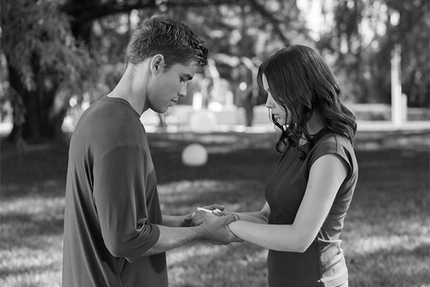In case you were like me and didn’t read the novel as a kid, here’s a brief summary: the story stars a boy named Jonas (11 in the novel, upped to 16 in the film), played by Brenton Thwaites. He lives in an idyllic society that has eliminated inequality, racism, and all forms of violence. Upon reaching the age of majority, he and his friends Asher (Cameron Monaghan) and Fiona (Odeya Rush) go through the Ceremony, a ritual where each new adult is assigned the job in which they will serve the community. While his friends are chosen for the common jobs of child-raiser and drone pilot, Jonas is selected for a very special role: he will become the next Receiver of Memories. Jonas’ society has been able to build their utopian community by purging all memories of the past from each member; these memories are carried by one person in case they are ever needed. As Jonas slowly receives the memories from his mentor (Jeff Bridges), he slowly starts to question the culture he has accepted without second thought until now.
Like I said, I thought this was going to be an action-packed young adult summer blockbuster, but it is not. In fact, this film has virtually no action whatsoever; there is a motorcycle chase towards the end, but there is no violence. Jonas’ community has supposedly advanced past the need for violence, so there are no weapons, and indeed most of the residents seem incapable of even conceiving the concept of violence. I found this extremely refreshing, as it left room for quality acting, character development, and world building. The film starts off in greyscale, gradually brightening up as Jonas receives more memories. One of the things the community has forgotten is color, and it is a shock to both Jonas and the viewer the first time he sees green trees and blue skies. Thwaites and Rush act in a purposely stilted and formal style to reflect the mannerisms of the community, but despite their relative inexperience they keep the film enjoyable. The community depicted in the film/book is sort of like a (mostly) kid-friendly version of the worlds depicted in 1984 or Brave New World.
And in fact, the themes of The Giver are not far off from those landmark works of dystopian fiction. Basically, the film questions whether we can achieve peace and harmony while simultaneously possessing free will. Further, it ponders whether peace and harmony achieved at the cost of free will is even peace and harmony in the first place. The film deals with some heavy stuff for being targeted towards young adults, and there are a few moments in particular that will shock those who haven’t read the novel (myself included). However, it doesn’t end up sounding preachy, but rather more like a fairytale with a moral woven into the story.
Judging by the trailers, one could easily be misled about this movie, and go into it expecting an action-fest. After all, pretty much all films targeted towards the young-adult crowd (and much of the literature too) focuses on action at the expense of plot and characterization, just like much of Hollywood’s recent fare. But The Giver is a much more meaningful and powerful film than most young-adult fare, showing that a film targeting that demographic doesn’t need to have action or high tension. At the end of the day, a meaningful story is enough.
Grade: B+

 RSS Feed
RSS Feed
